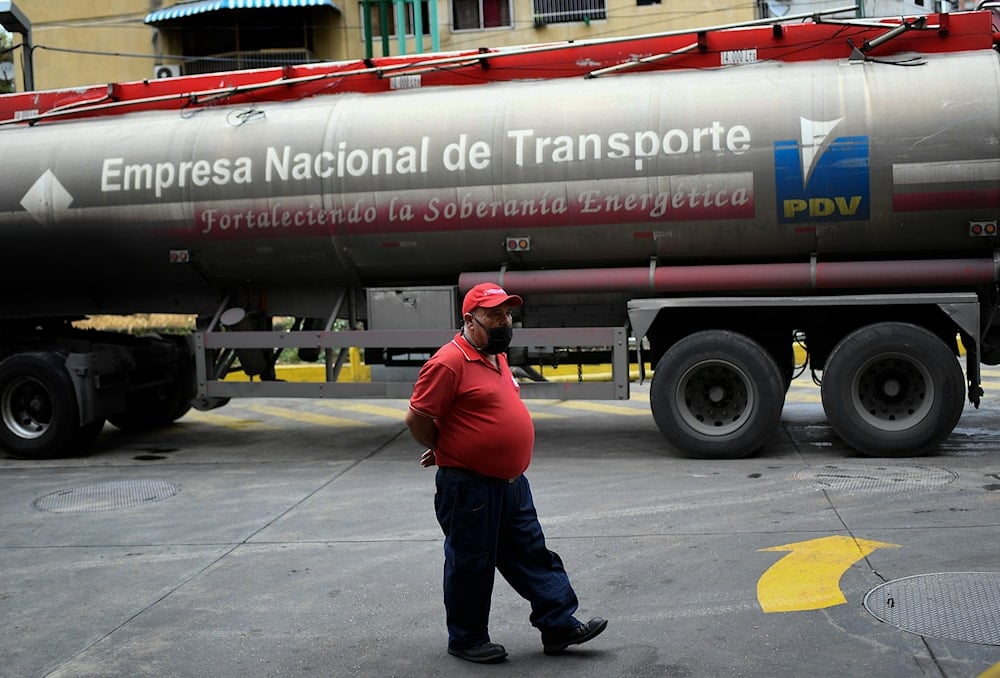Venezuela says industry ready for new sanctions, warns of effect on US
The Venezuelan oil industry is still struggling under existing and emerging US economic sanctions regardless of an increase in crude output.
-

A worker wearing a face mask amid the coronavirus pandemic waits while a tanker truck supplies gasoline to a state oil company gas station in Caracas, Venezuela, Sunday, May 31, 2020 (AP)
The Organization of Petroleum Exporting Countries (OPEC) latest monthly report reveals that Venezuela's January crude output has increased by 14,000 barrels per day (bpd) from December reaching 796,000 bpd.
State oil company PDVSA also reported an increased figure of 841,000 bpd, up from 802,000 bpd the prior month.
However, this increase in the production outcome was not accompanied by an increase in sales but rather a 25 percent decrease in exports month-to-month in January as a result of power outages at Venezuela's main loading terminal in eastern Anzoátegui state.
Venezuela: a victim of US sanctions
Since mid-2017, Venezuela’s most important economic sector, the oil sector, has been subjected to US sanctions. The USA has implemented financial sanctions, an oil embargo, secondary sanctions, and a raft of restrictions targeting the country's main income source.
In 2020, the crude output hit its lowest record in its history of 350,000 bpd, falling from around 1.9 million bpd before the first sanctions. Even though the industry has steadily gotten better since then, it failed to reach a 1 million bpd target.
In October 2023, the US Treasury Department released General License 44 (GL44) giving a six-month waiver on dealings with Venezuela’s energy sector, noting that the Biden administration issued the GL44 and other licenses amid the Barbados agreement between President Nicolas Maduro's government and the US-backed opposition.
The Treasury’s Office of Foreign Assets Control warned companies against investing in Venezuela during that authorization. In the months since, several corporations, including France’s Maurel & Prom, have expanded activity in joint projects with PDVSA, but these deals only have finite benefits for the country’s crude production.
Same old US story: a proxy in every part of the world
In recent weeks, US officials repealed a license authorizing dealings with Venezuela’s mining sector and have continuously threatened not to renew the oil and gas license as it expires in April. This comes as the US seeks to exert pressure to impose Maria Corina Machado as a candidate in this year’s presidential elections. Machado is a far-right candidate who appealed against a political ban rejected by Venezuela’s Supreme Court.
Venezuelan officials, including Oil Minister Pedro Tellechea, have stated that the industry is ready for new US sanctions, warning that this will eventually affect the US markets and supplies.
No license and the threat of secondary sanctions
Economist Francisco Rodríguez estimated that the non-renewal of GL44 would represent a blow of $1.6 billion in this year’s oil revenues, arguing that even with the waiver gone, much will be in the fate of whether the US Treasury will actively stop firms from purchasing Venezuelan crude by threatening them with secondary sanctions.
Analysts also expect a wider output decrease if the USA also withdraws the license related to Chevron, which is a US energy giant that initiated its activity in its Venezuela joint ventures following a November 2022 sanctions waiver and a 200,000 bpd target for 2024.
An emergence of oil sanctions will stop PDVSA’s ongoing possibilities of rebuilding ventures and maintaining new customers as Indian state-owned companies ONGC and Oil India are both interested in deeper involvement in the Venezuelan oil sector. India’s multinational refiner Reliance Industries has also bought Venezuelan crude cargoes in recent weeks.
With tightened sanctions, PDVSA will be forced again to count on unreliable intermediaries, unlike the break it got during the October license allowing it to sell crude with fewer restrictions. In March 2023, Venezuelan authorities revealed a corruption scheme that cost the industry billions of dollars from unaccounted oil sales and resulted in dozens of arrests.
The expiry of GL44 could also lead to fuel deficiencies again, which prompted PDVSA to initiate swap deals with partners such as Chevron, Maurel & Prom, Spain’s Repsol, and Italy’s Eni to boost its supplies of fuel and diluents for refineries.
Even though Venezuela has tried to get help from Iran in recent years, refineries remain affected by operational hurdles and are unable to meet demand. The depletion of gasoline mainly diesel has serious consequences for electricity generation, public transportation, and agriculture.

 4 Min Read
4 Min Read








